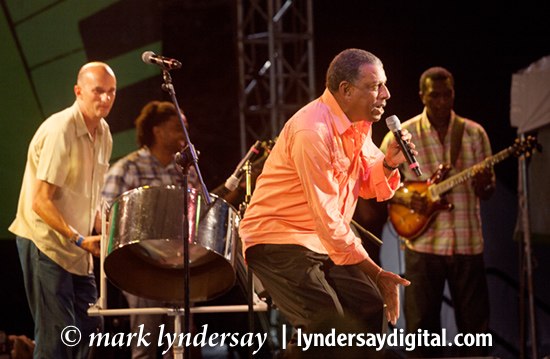Jazz Artists on the Greens 2013
25/03/13 19:36 Filed in: Reviews
Jamming at Farm Road
A review of Jazz Artists on the Greens 2013, originally published in the Trinidad Guardian on March 22, 2013.

Lord Relator, singing his popular calypso Gavaskar, was a guest performer with Andy Narell's quintet at Jazz Artists on the Greens at the WASA compound, Farm Road, St Joseph. Photograph by Mark Lyndersay.
Jazz Artists on the Greens (JAOTG) is, after more than ten years, something of a fixture on the performance calendar. That consistency of production quality made it more than a little surprising that the team at Production One managed to underestimate their audience by more than 30 percent, turning the five-hour show into a standing room only event for quite a large section of their audience.
The shows that I’ve attended have always struggled with the ongoing dilemma of the local jazz show, balancing crowd pleasing choices with jazz credibility, and nothing exemplified that challenge better than the set by the Xavier Strings.
I’ll be blunt here. I don’t get the Xavier Strings. But then I don’t get Bond or the Alternative Quartet either.
The sisters that lead the band, Janelle and Janine Xavier, are smart enough to realise that as beautiful as the violin is, using it as the lead instrument to reinterpret popular songs is a one-trick pony, albeit a quite symphonic one.
After vamping agreeably on the Mission Impossible theme and doing teasingly interesting work on songs by Michael Jackson and Adele they hit their stride with a delightfully fragmented version of Night in Tunisia, which made intelligent use of the band backing them.
The arrangement and spare, focused treatment of the song was so striking that it made the band’s lapse back into much less exploratory work quite irritating.
Beyond an effort to expand the range of the band with some throaty vocals from sister Janelle, a pleasant, though hardly authoritative outing, the band settled for melodic and soothing though hardly intriguing string treatments of local songs.
The Alexis Baro Latin Jazz Sextet came charging right out of the gate with Wake up Call, a brisk number that gave everyone in the band a solo flourish and established the band as the night’s firebrands.
On Coltrane’s Naima, already a haunting composition, Baro slowed the music down to the point of faltering, the sax and trumpet solos fluttering and soaring across a beat that was slowed past a funeral pace.
Dear Friend, a piece Baro dedicated to a Trini friend too ill to attend the show, began with a mournful, extended passage featuring Jeff King on the tenor sax before breaking into a wildly enthusiastic and distinctly Caribbean breakaway jam, filtered compellingly through the bandleader’s very Latino sensibilities.
Having engaged the audience with his homage to regional beats, he announced Jazz it up with a call to party, yelling “This is dancing music!”
And some did, though the funky composition proved to be more suitable for a gentle bounce than an outright boogie or wine back, at least until the band left them beatless with an extended and articulate conversation between Baro’s trumpet and King’s sax.
Closing the night was Andy Narell, backed by a strong supporting band pulled from the local jazz elite. In Raf Robertson and Theron Shaw, positioned as frontmen alongside the pannist, he had comperes capable of running the distance with him.
Narell gets a lot of stick, not for what he’s done with the national instrument, but for his cocky presumption that he knows what’s best for it.
That’s worth mentioning, because it was a very serious looking and circumspect Andy Narell who took the stage at JAOTG, fidgeting through his first two numbers and constantly throwing anxious looks at the audio mix team.
His concerns were justified. The first number, his sparkling version of Sugar for Pan from the University of Calypso album collaboration with Relator, turned out muddy, the high notes drowned by an indistinct blur of bass and drum.
The mix cleaned up, and Andy Narell settled down, though never seemed fully at ease during the performance.
He needn’t have fretted though. The work he does with the pan is confident, assured and inventive, while remaining suitably reverent to its source and inspiration. Nobody who has heard University of Calypso can doubt the pannist’s great love for T&T calypso and his first full smile of the night came as the band backed Relator on Gavaskar.
Another notable number was Raf Robertson’s earthy arrangement of Andre Tanker’s Forward Home, which, slowed down to emphasise a surprisingly angry bass line, seemed to channel all the indignation that accompanied the reclamation of Afro-Caribbean pride that the song provided the soundtrack for.
This year’s edition of JAOTG was a briskly produced five-hour production that was only marred by a shortage of seats. It’s a worthy entry in the jazz series.
A review of Jazz Artists on the Greens 2013, originally published in the Trinidad Guardian on March 22, 2013.

Lord Relator, singing his popular calypso Gavaskar, was a guest performer with Andy Narell's quintet at Jazz Artists on the Greens at the WASA compound, Farm Road, St Joseph. Photograph by Mark Lyndersay.
Jazz Artists on the Greens (JAOTG) is, after more than ten years, something of a fixture on the performance calendar. That consistency of production quality made it more than a little surprising that the team at Production One managed to underestimate their audience by more than 30 percent, turning the five-hour show into a standing room only event for quite a large section of their audience.
The shows that I’ve attended have always struggled with the ongoing dilemma of the local jazz show, balancing crowd pleasing choices with jazz credibility, and nothing exemplified that challenge better than the set by the Xavier Strings.
I’ll be blunt here. I don’t get the Xavier Strings. But then I don’t get Bond or the Alternative Quartet either.
The sisters that lead the band, Janelle and Janine Xavier, are smart enough to realise that as beautiful as the violin is, using it as the lead instrument to reinterpret popular songs is a one-trick pony, albeit a quite symphonic one.
After vamping agreeably on the Mission Impossible theme and doing teasingly interesting work on songs by Michael Jackson and Adele they hit their stride with a delightfully fragmented version of Night in Tunisia, which made intelligent use of the band backing them.
The arrangement and spare, focused treatment of the song was so striking that it made the band’s lapse back into much less exploratory work quite irritating.
Beyond an effort to expand the range of the band with some throaty vocals from sister Janelle, a pleasant, though hardly authoritative outing, the band settled for melodic and soothing though hardly intriguing string treatments of local songs.
The Alexis Baro Latin Jazz Sextet came charging right out of the gate with Wake up Call, a brisk number that gave everyone in the band a solo flourish and established the band as the night’s firebrands.
On Coltrane’s Naima, already a haunting composition, Baro slowed the music down to the point of faltering, the sax and trumpet solos fluttering and soaring across a beat that was slowed past a funeral pace.
Dear Friend, a piece Baro dedicated to a Trini friend too ill to attend the show, began with a mournful, extended passage featuring Jeff King on the tenor sax before breaking into a wildly enthusiastic and distinctly Caribbean breakaway jam, filtered compellingly through the bandleader’s very Latino sensibilities.
Having engaged the audience with his homage to regional beats, he announced Jazz it up with a call to party, yelling “This is dancing music!”
And some did, though the funky composition proved to be more suitable for a gentle bounce than an outright boogie or wine back, at least until the band left them beatless with an extended and articulate conversation between Baro’s trumpet and King’s sax.
Closing the night was Andy Narell, backed by a strong supporting band pulled from the local jazz elite. In Raf Robertson and Theron Shaw, positioned as frontmen alongside the pannist, he had comperes capable of running the distance with him.
Narell gets a lot of stick, not for what he’s done with the national instrument, but for his cocky presumption that he knows what’s best for it.
That’s worth mentioning, because it was a very serious looking and circumspect Andy Narell who took the stage at JAOTG, fidgeting through his first two numbers and constantly throwing anxious looks at the audio mix team.
His concerns were justified. The first number, his sparkling version of Sugar for Pan from the University of Calypso album collaboration with Relator, turned out muddy, the high notes drowned by an indistinct blur of bass and drum.
The mix cleaned up, and Andy Narell settled down, though never seemed fully at ease during the performance.
He needn’t have fretted though. The work he does with the pan is confident, assured and inventive, while remaining suitably reverent to its source and inspiration. Nobody who has heard University of Calypso can doubt the pannist’s great love for T&T calypso and his first full smile of the night came as the band backed Relator on Gavaskar.
Another notable number was Raf Robertson’s earthy arrangement of Andre Tanker’s Forward Home, which, slowed down to emphasise a surprisingly angry bass line, seemed to channel all the indignation that accompanied the reclamation of Afro-Caribbean pride that the song provided the soundtrack for.
This year’s edition of JAOTG was a briskly produced five-hour production that was only marred by a shortage of seats. It’s a worthy entry in the jazz series.
blog comments powered by Disqus



